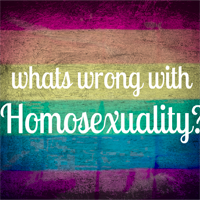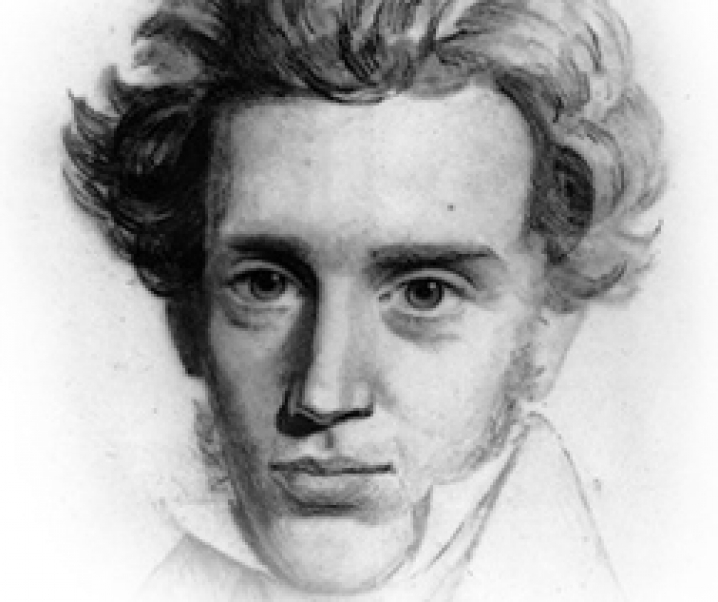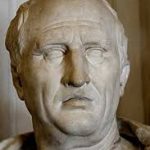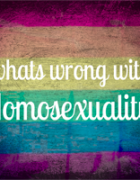PART TWO:
The Theological Perspective
(Revised March 5, 2014)
![]()
To those who exist outside of the church, it may come as a surprise for you to know that in the last 10 years the issue of homosexuality has really divided the church. Part of the reason for this has nothing to do with the actual topic itself. Instead, it’s more about the ongoing tension that exists between “modern” and “postmodern” Christians. Although this tension is convoluted, much of it surrounds the issue of biblical authority.
See a basic comparison chart >>
This is an important note of context because there seems to be an assumption in the LGBT community that religion is just “anti-gay”, which results in an unnecessary estrangement. I am in hopes that this section will act as a buffer against this false perspective, as well as present the proper Christian perspective (in my humble opinion of course). In the end it may be that both groups still disagree – there is nothing wrong with disagreement as long as it is based on accurate information and devoid of stereotypes.
In general, “modern” Christians believe that the bible condemns homosexuality, in any form, as a sin. I am purposely excluding the “crazies” or “fundamentalists” who fall into this category as they don’t represent mainstream thinking within Christian Modernism. And to be honest no one cares what they think.
“Postmodern” Christians (AKA Progressive Christians) mostly (but not all) accept our current cultural form of homosexuality primarily because they don’t believe the way it is described in the bible is the same that is practiced today. For example, the bible’s version of homosexuality involves those who practice the behavior as a means of sensual gratification and does not include those who may practice homosexuality within the confines of a meaningful/loving relationship.
Since almost the entirety of Christian faith is based upon the bible, we will look at the key passages that are often used in an attempt to understand what they mean within their context. From there we will form a conclusion based on how we have understood the biblical information so as to provide a proper understanding for Christians.
![]()
The Old Testament
From what we have learned from the aforementioned historical context, we know that ancient societies practiced the act of homosexuality. Moreover, this was simply a result of their particular sexual proclivities and existed extramarital.
Depending on your theological persuasion (no pun intended) you view the Old Testament (hereafter OT) as being either, superseded by the New Testament and therefore irrelevant for today’s culture; or, as one part of a larger story.
An often used proof-text against homosexuality is the well-known story of Sodom and Gomorrah (Genesis 18:22-19:38). In this story, there is a disturbing scene where the “angels of the lord” take refuge with Lot and his family. The MEN and BOYS of the city come to Lot’s door and ask that Lot let his guests come outside so they could “have their way with them”. Ultimately, God destroys the cities.
This story is often used to demonstrate God’s hatred of homosexuality. However, this would be a gross misinterpretation of the text. First, the only thing the story tells us is that God hates sin. In Chapter 18 we are told why God wants to destroy the city “there was not one who was righteous.” God does not destroy Sodom and Gomorrah simply because they were practicing homosexuality. For many cultures during that time practiced this. It seems more likely it was due to their complete disregard for God and basic civility. The people of the city were barbarians and had no regard for human life and dignity. Perhaps the act of homosexuality was one of those, but the text does not mention anything in particular.
The Law
Closely related to the story of Sodom and Gomorrah is the invocation of the Law in Leviticus. Leviticus 18:22 and 20:13 are almost identical.
“If a man lies with a male as with a woman, both of them have committed an abomination; they shall surely be put to death; their blood is upon them”
Although the verse itself seems fairly straight forward, it is important to understand what it means within its proper context. If you were to pan out from this verse and observe the section in its entirety you would note verse 18:3
“You shall not do as they do in the land of Egypt, where you lived, and you shall not do as they do in the land of Canaan, to which I am bringing you. You shall not walk in their statutes.”
How then should we understand what is being said here. Certainly, one can take it literally and understand it simply as an indictment on homosexuality. (Although, I would argue that if you are going to stick to a literal interpretation, then you also have to say that this doesn’t apply to women as they are not mentioned.) However, I think many of us are uncertain as to what question we should ask the text. It does seem that same-sex relations are being condemned. The logical question then seems to be, why is it being condemned?
The passage goes on to describe how God doesn’t want Israel to be like the nations from which he rescued them from (first Egypt, and second, Cannon). If you were to fast forward through the OT you would see that this ends up being the ongoing tension between God and Israel; namely, Israel wants to be like the other nations (so as to seem legitimate to them) whereas God wants them to be “set apart”.
![]()
The New Testament
The New Testament (hereafter NT) passages that are often cited in this discussion are: Romans 1-2; 1 Corinthians 6:9-11; & 1 Timothy 1:10.
It is primarily these passages that tend to separate Modern and Postmodern Christians. This creates a curious question: if both groups are reading the same passages and those passages seem to clearly speak against homosexuality as a sin, then why are they coming up with radically different conclusions?
The answer goes back to the real problem between these two groups; namely, how one reads the bible. For Modernism there is irony regarding a worldview that is predicated upon the idea that scientific inquiry and analytic thinking is the cornerstone of rationality, and yet, it is this very way of thinking that hinders Modernism from asking the “right” questions regarding these sorts of texts. Perhaps it even prevents them from asking ANY question of the text. Reading the text with the eyes of modernism requires such a narrow focus on the propositions sitting in front of them (in conjunction with their presuppositions on truth), that many tend to become blind to all of the information that exists in the surrounding milieu.
In this particular case Postmodern Christians are asking the right question; namely, would God condemn the act of homosexuality within the loving confines of a marriage? Most do not disagree with the fact that homosexuality, as the bible presents it, is being condemned. But because we fail to understand our cultural assumptions we are blind to the reality of history as a different world. The question we should ask is, how does the bible present homosexuality? The bible presents it in the same manner that history does; namely, it is an extramarital sexual proclivity. This, of course, begs the question, what if it’s within the confines of marriage? The bible does not answer this question because it’s not part of the bible’s historical milieu.
The NT does seem to focus heavily on loving meaningful relationships within the confines of marriage. The Postmodern question is, why can’t this happen within a homosexual union? And, if this is true should not Christians then support homosexual marriage?
The problem of Romans 1: a brief study
If we simply stopped the conversation here, then I would be inclined to agree with the overall Postmodern position regarding homosexuality. However, there is the problem of Romans 1 & 2 that adds another important aspect to the discussion.
The book of Romans begins with the idea that all of humanity has rebelled against God through the selfish desires of their heart (it is here that Paul mentions homosexuality). Paul using this context in order to help the reader better understand why Worship of Christ is a necessary requirement for humanity (later half of Romans).

Let’s take what Paul says in order:
Verse 18 begins with “but”, this indicates that what is about to be mentioned is being contrasted against what was previously stated. What was previously discussed (Romans 1:1-17) is regarding what it means to have faith in Christ. Therefore, the subsequent conversation will involve those things which indicate an individual is not living the life of Christ. We find the answer to this in the latter half of verse 18. That is, God is angry against ALL SINFUL wicked people who suppress the truth of God by their wickedness.
Here are some important questions we have to ask ourselves during this study.
- Who is Paul referring to when he says “they”?
- Is Paul describing a single event, multiple events, or a way of thinking?
- Can we differentiate when Paul is “prescribing” and/or “describing” events?
Paul finishes his thought (18-20) by talking about how God has revealed himself since the beginning of creation. Theologians refer to this as “general revelation”.
However, and more importantly, “since the beginning of creation” gives us a clue that Paul is speaking about the past and that whatever he is talking about has happened since the beginning of creation.
Confirming this for us is the next verse (21). The verse begins by saying “Yes, they knew God…” The passage continues in the passive voice using the third person pronoun. This shows us two things first, that he is distancing himself (and his audience) from what he is speaking about (in this particular case, idolatry); second, that he is certainly speaking about a the past. For some reason this fact is often overlooked in this discussion.
Up to this point, Paul is providing the reader context for what his main point is going to be. Unfortunately, so many people read the bible propositionally, that it’s easy to jump to what you think is the point, apart from the context, thus postulating a conclusion which is devoid of truth.
Therefore, the question we MUST ask ourselves as we continue reading is, when does Paul’s context stop and his main point begin? This has been a crucial mis-step by many who try to understand this passage.
This brings us to Paul’s next thought (verses 24-32), which is oftentimes only partly quoted. You cannot understand what Paul is saying here apart from reading the whole thought.
The first observation, almost glaringly obvious, is that Paul is still speaking in past tense “…God abandoned them…” In fact, this tells us that Paul is not only still providing context, but he is still talking about “something else” at some “other time” in history.
There are two main points within this one thought. that is, to what extent sin effects our “behavior” (24-27); it also effects our “thinking” (28-32) and vice versa. The behavior Paul describes here is the inevitable result of living a life apart from God. Paul gives ONE example (among many examples he could give, and in fact does in the next section) of homosexual behavior. The important distinction to make here is between the “act of homosexual behavior” and “being homosexual”. As stated before, neither Paul, nor the other biblical writers, make this distinction. Therefore, up to this point we still have no basis for condemning homosexuality within the confines of a loving marital relationship.
However, there are two additional observations that need to be made in this passage: verse 25 states “…God abandoned them to their shameful desires…” and “…even the women turned against the natural way to have sex…” Then in verse 27 “…and the men, instead of having normal sexual relations with women burned with lust for each other…”
We are given two examples, both of which contain the same elements. That is, they both answer the question “what is natural?” And, they also seem to indicate the “intentions” of those who performed those acts.
First, Paul is clear that the act of homosexuality is not natural. Therefore, it seems to follow then that it does not matter if the “act” was performed in the confines of a meaningful relationship or as a proclivity. Second, “desire” and “burned with lust” indicate the intentionality that exists as part of the story Paul is telling. Those who committed acts of homosexuality did so with the intention of sexual gratification. In other words, Paul seems to be reinforcing his previous assertion, by implying that when these people performed these acts it was NOT because they were simply attracted to the same sex, but was the result of some proclivity.
Now, its important for us not to create conclusions based upon whats not being said. Moreover, we must reiterate the fact that Paul is not addressing our modern dilemma. He is only talking about the act itself.
It’s not until the end of the section that, Paul ends this section describing the “act” as sin (“…as a result of this sin…”).
The second part deals with how sin has affected the individuals thinking. Here we see Paul list more sins with the same intensity that he describes the sin of homosexuality. The idea here being that repetitive sinful behavior eventually changes how you see the world, even to the point of hating God.
When we take things out of context we miss the point: concluding Romans
It turns out that all of chapter 1 is historical context for what Paul begins to preach on in Chapter 2. Paul states that it is the ACT of homosexuality that sin. His reason is because it is NOT natural and is the inevitable result of a humanity who has abandoned God. Therefore, if the act of homosexuality (same sex relations) is present (which, why wouldn’t it be), then even homosexuality within the confines of a meaningful relationship is still sin. Interestingly Paul is also (albeit indirectly) saying it’s NORMAL. Something can be normal and still not natural.
In chapter 2, he changes his tense from “they, their, them” in chapter 1 to “you” in chapter 2. Probably the most profound (and most important) part of this conversation is what Paul says in Romans 2:1-4 (and is something we conveniently leave out in this conversation):
Wow. Ironic, isn’t it? Paul is writing this passage to Christians regarding how they treat a specific subculture within Rome, and yet, this is the same passage Christians today use to condemn the same group of people that Paul tells us not to condemn. If you remember only one thing let it be this, Paul states that it’s through “kindness, tolerance, and patience” that people turn from their sin; NOT condemnation!
![]()
Either, Why Christians feel alienated from culture OR, why Christians fail to make an impact on culture.
It’s quite simple really! Christians today feel alienated from culture because of the Christians from yesterday (many still lingering around today) chose to alienate themselves from culture. It’s the combination of a faulty modern worldview coupled with an arrogant struggle for power.
The first is a theological/philosophical problem. I address this issue in my article: Why religion and science are both wrong. In addition to that article, I would add, even a significant number of Christians feel alienated from Christianity by those who clamor to the modern worldview. You don’t have to look much further than the Modernism/Postmodernism debates to see the absolute hatred many modern Christians have for those of that worldview. If their attitude is this bad within the Church; how much worse is the perception outside of the church?
The second is a cultural problem. For far too long religious zealots in academics, politics and the church have spent much of their time trying to preserve a political ideology that never actually existed; namely, this idea of America as a Christian nation. The inability for people to understand the difference between the forefathers of our country forming a nation out of the need for religious freedom as opposed to a nation that should be governed by the religious, is mind blowing. This is what Soren Kierkegaard referred to as the problem of “Christendom”. Furthermore, it is neither biblical nor culturally beneficial.
Although this ideology has ebbed and flowed throughout American history, it has seen a significant resurgence in the last 15 years. This ideology is not only a false perception of our country’s historical reality, but it produces a false sense of entitlement.
This entitlement has manifested in several ways, from attempting to force Christian ideals through the legislation of morality to public displays of outrage over extending rights to certain subcultures to controlling what is being taught in public schools. Moreover, it should not surprise Christians that there exists a significant tension between the secular and the religious in our culture. When you point your finger at people and are constantly pointing out their faults, you are going to become the minority when that subculture becomes the predominate power broker within culture. Christianity in our country is now simply receiving what it has so generously handed out over the last hundred years.
Understanding why something happens and excepting that fact are two different things. I don’t think that anyone should be discriminated against for their faith (or sexual preference). The answer is not to fight against that power struggle, but to slowly change it through what we are told in the passage above “kindness, tolerance, and patience”.
Perhaps the best thing that could happen to Christianity within this country is for it to become a “minority” again. Though the exact phrase has left me there is an old Kierkegaard quote that goes something like “…Christianity ceased to exist once it became legal” (this of course is in reference to Constantine). There is something true about that statement.
![]()
What Christians should do differently: some aphorisms
- Christians must exercise humility when it comes to Scripture and recognize that it was written for THEM not the “secular”.
- Christians need to stop listening to everyone else and begin forming their own (informed) conclusions.
- Christians should understand that they have no right to force their moral beliefs upon others (the same would be true of the secular).
- Christians should recognize that our differences makes us stronger, not weaker.
- Christians should imitate the same love and compassion that Christ had for people, and hold that up as the supreme Christian ideal.
- Christians should understand that it’s not about how loud or often you speak, but knowing what to say, and when to say it.
- Christians have nothing to be ashamed of. Moreover, they must stop being on the defensive, which begins with the presupposition that one has something that has to be defended. Moreover, it gives legitimacy to the secular where there may not be one to begin with.
























Ralph
March 4, 2014Good discussion, Eric. I especially like “The answer is not to fight against that power, but to slowly change it through what we are told in the passage above “kindness, tolerance, and patience”. My own theology is changing; that is, I would consider it developing or maturing, in the last few years. “We fight not against flesh and blood…” – taking strong ideological positions, especially those with the strongest propositionally based logical structures (linguistic machinery) is devoid of life. Love is essentially creative in its expression. What we see in the expression of form is an instance of perspective. You referred to some place where God was angry. The anthropormorphic projection of unrestrained human emotion presents a reactive God rather than an eternally unchanging Spirit who is Love. Or, to put it more colloquially, if God is not there anymore, who moved? The wrath of God is simply the repositioning of our perspective and alignment to the love that God is in an oppositional way. The all-knowing God doesn’t blow his top reactively when he “discovers”. someone breaking the rules (sinning).
So, the banter about finding the “right” interpretation of scripture (especially about homosexuality) wreaks of a culturally Greek notion of seeking knowledge externally from our own conscience (note that etymologically conscience means “with knowledge”). Everything I do wreaks of sin because I lack a pure motive in myself. I must be tolerant but not necessarily accepting or rejoicing in what I find to be questionable behavior. When I act “with knowledge” that means with an experience of relationship – of knowing by my inward experience. Civil laws will come and go as do the social mores which drive them. Civil law is not holy law. These are expedients for the working of societies. Hopefully, we influence civil law in the making of laws and the disposal of laws no longer relevant to the peoples or societies for which they were originally intended.
I find vicious self-justifying demanding rights frightful and dangerous to real love being expressed in community. For me and my practice of faith, when the for and against polarize in their respective positions and get hateful and violent, it is time to withdraw because “not of this world” means not investing heavily in correcting the unfixable.
Eric English
March 4, 2014Ralph,
You are a sage and a poet. I appreciate your contribution to the post as you have added an interesting dynamic to the conversation. I will certainly need to re-read it a few more times as to make sure I have captured everything. It does appear, although I am not positive, that you are mostly responding to a different post. Perhaps, “Christan’s in the hands of an angry God”. I am in hopes you understood the irony of the title, which was meant to represent style and not substance per se. With that said, I would be interested to hear more about the idea of shifted perspective. I consider myself a modified perspectivist so it would be interesting to learn more about what appears to be (as I understand you anyway) the psychological perspective that exists in our positioning relative to an entity we call God. Also, I am not sure if you were speaking in general or you were saying this of me: “the banter about finding the “right” interpretation of scripture (especially about homosexuality) wreaks of a culturally Greek notion of seeking knowledge externally from our own conscience (note that etymologically conscience means “with knowledge”).” Thanks again for the contribution. Would love to hear more from you in the future.
Ralph
March 6, 2014Thanks, Eric. I would have preferred being a poet and philosopher but it just doesn’t pay the bills. Typically of how I speak, I think I may have tried to ramrod too much idea into too small a space. I meant to step back and try to discuss issues of life as being a general pattern over which we could apply a perspective to the current hot social issues of homosexual behavior.
Having read more on your site since my discovery of it a couple of days ago, I think we have a lot in common on theology and philosophy. My view on a “proper” Christian attitude towards homosexuality is that “proper” attitudes are not fixed. A “love the sinner but hate the sin” slogan sounds like love with the left hand and judge with the right hand. Our influence should be to love and not judge another (ie. pass sentence). And there is a time to openly resist what we understand as sin. That time varies on culture, circumstance and personal conviction.
Now, homosexuality is not anything outside of normal human experience, like lust for the other sex or lust for power or a deep desire for a mate in an accepting social context. Therefore, I have no goal of strictly defining right and wrong behavior which is not to say that any behavior is acceptable. We know God through conscience and we know that legalistically following an interpretation of scripture does not give life. We should therefore, practically speaking, allow for others to make judgments of conscience for themselves since that is the only way anyone can know God.
Within the church, though, the questions of acceptable social behavior become more difficult. I can see where homosexual behavior is simply not accepted. I can also see where it would be better to invite homosexual couples into fellowship. But such a decision is for folks with a deep clear sense of what a true spirituality is (exercising love with deep wisdom). I personally find celebrating homosexuality something I cannot embrace. I may change my perspective one way or another as my experience and maturity changes . Finding the correct rule does not give life. A rule is the shell form of what we see when the power of life is expressed. But the rule is not life. Having a perfect understanding is not possible in this life giving us yet another reason to err in the direction of tolerance. I would find it very hard to dissociate myself from a man full of kindness and sacrifice for those around him even if he had an intimate male partner. I would want to support his good works, albeit perhaps not the nature of his relationship. My position is that the power of life, which is Christ (“I am the way, truth and life”) would work truth into this persons life or the good being done would be extinguished. I should be there to support lively good works.
It’s easy to slip into zealous self-justifying denial, or for that matter, affirmation of a position – in this case we are discussing homosexuality. Neither being for or against homosexuality would be as sinful as the self-justifying attitude used to set up emotional bulwark against other people made in the image and after the likeness of God.
I know for many folks what I have said is a non-answer. I would have to disagree. What I have tried to say is I agree with your post, Eric (as I read and understood it) that the answer is not in a simple intellection because it requires engagement of who we are as people. Our answer as “people of God” is to creatively find ways to love those around us rather than running around shouting, “Unclean! Unclean!”
Eric English
March 7, 2014Perhaps this may not be a surprise to you, but I am always amazed (then quickly angered) at how many Christians error on the side of intolerance instead of tolerance.
Inviting homosexual couples into Church seems to be a non-issue right now. Although I used to be someone who advocated this, I have more recently come to the understanding that as long as the Church views homosexuality as “sin” homosexual couples will not come into the Church. In fact, I am more prone to argue that their relationship to the Church is a separate issue from how the Church should treat the issue.
The larger issue though is that the Church has failed to address sexuality on a larger scale.
Thank you so much for visiting and your words of insight and wisdom. I hope you will come back again.
Cheers.
Frank
March 8, 2014Well its hard to follow along when you do t have all ten facts. Committed homosexual relationships and even “marriages” existed in Ancient Rome,China and the African continent. So to say that homosexuality is somehow different today the. It was in biblical times or that the bible from referring to only temple prostitution or pederasty is completely false. The biblical writers knew exactly what they were talking about and it applies as much today as it do then. All homosexual behavior is sinful and a rejection of Gods will regarding sexuality and marriage. No way to get around that no matter how hard people try to.
Eric English
March 8, 2014Frank,
Thanks for taking the time to post a comment. Two things: first, I’m not sure where you get your information, but you cited no sources except your opinion; and as a result, you are incorrect in your understanding of the historicity of homosexuality.
Second, your last statement seems to make clear that you either didn’t read the whole article or you didn’t understand what you read. I drew the same conclusion you made. That is, Paul states that the “act” of homosexuality is indeed sin; therefore, it doesn’t matter if he is speaking in the context of those in a committed relationship or not, because the “act” is present in both.
Frank
March 10, 2014Same-Sex Unions throughout Time
A History of Gay Marriage
Historians of same-sex marriage take great care to place the modern debate over the legality of gay marriage into an historical framework. The debate has taken on a sharply political dimension in recent years, a culmination of some 40 years of heightened tension surrounding the cultural question. That question is not easily answered because it is complicated by societal and individual interpretations of standards. The historical framework surrounding the debate supports both sides, from claims based upon religious texts to interpretations of the U.S. Constitution. Unfortunately, the debate has often not been civil, and those who are the subject of the debate have suffered emotional and physical violence (and unequal protection) as their societies have struggled to answer the question. While repression is not unique in the history of gay rights and gay marriage, neither is the alternative. At times throughout history, same-sex relationships have enjoyed relative freedom within their respective places.
Same-Sex Relationships in Early Civilization
gay egyptian men Ancient evidence survives of kingdom-sanctioned, same-sex cohabitation, as in the tomb drawings of Niankhkhnum and Khnumhotep Evidence exists that same-sex marriages were tolerated in parts of Mesopotamia and ancient Egypt. Artifacts from Egypt, for example, show that same-sex relationships not only existed, but the discovery of a pharaonic tomb for such a couple shows their union was recognized by the kingdom. Meanwhile, accounts of the Israelites’ departure for Canaan include their condemnation of Egyptian acceptance of same-sex practice. In actuality, same-sex marital practices and rituals are less known in Egypt compared to Mesopotamia, where documents exist for a variety of marital practices, including male lovers of kings and polyandry. None of the recorded laws of Mesopotamia, including the Code of Hammurabi, contain restrictions against same-sex unions despite the fact that marriages are otherwise well regulated (Eskridge).
Classical antiquity in the Western world is frequently cited for examples of same-sex love and relationships, though separate concepts of homosexuality and heterosexuality did not exist in the same way as today. Plato’s Symposium, for example, describes instances of homosexual attraction and same-sex relationships in ancient Greece without condemnation. Some point to examples of same-sex interaction in Greek artwork as further evidence of its equal status within the society. Individual, higher status, however, was of critical importance to free expression of love.
Status enabled older men, beginning in their 20s and 30s to act as mentor to a younger male who had not yet reached adulthood. The relationship consisted of a standardized courtship ritual and the basic belief that male attraction to other men was typically considered to be a sign of masculinity. Same-sex unions were known to have occurred in addition to opposite-sex marriages, existing simultaneously as an educational union available between teacher and pupil, for both men and women outside of their heterosexual arrangement. Such beliefs were not universal in ancient Greece, however. Some states disapproved of the rituals and relationships (Pickett).
The main considerations in same-sex relationships in early history were often love, beauty, and excellence of character rather than gender. There was also a cultural-religious basis for homosexual practice. Greek mythology records “same-sex exploits” by gods as high ranking as Zeus. And the epics of Homer, the Iliad and the Odyssey, contain poetic passages that suggested homoerotic love to the educated hearer. But the culture underwent a transition during which homosexual expressions of love went from overt to covert (Dynes).
Roman social customs are relatively well known, and same-sex unions existed as high in society as among Roman emperors. Roman statesman Cicero also documented legal rights of an individual within a same-sex marriage. Female same-sex unions seemed to have been less common, but only because women enjoyed less freedom in their economic and social endeavors (Eskridge).
Over time, Rome experienced a similar trajectory as Greece between the early republic and the later empire, and negative attitude toward same-sex unions and non-procreative sexuality increased with the rise of Christianity in the Roman Empire (Pickett). By the fourth century, anxiety toward obviously pervasive same-sex unions reached a peak when the state passed a law promising punishment to anyone entering a same-sex marriage (Eskridge).
Frank
March 10, 2014http://www.randomhistory.com/history-of-gay-marriage.html
Eric English
March 11, 2014Did you actually read this article?
1. Let me comment about the nature of history – it’s not absolute. It requires an interpretive framework that is not much different from that of the bible.
2. The article you quoted above states right at the beginning “The historical framework surrounding the debate supports both sides…” This is an important observation because this means that all of the subsequent information has various interpretations and perspectives.
3. The evidence regarding ancient practices: the Mesopotamian information fails to make any distinction between cohabitation and marriage. Notice the inscription only refers to cohabitation. There is not positive argument for the Egyptian information (unless you are trying to make one from silence as it seems the author of the article might be implying).
4. You fail to distinguish between some important concepts (and for what its worth I was in error here in one part as well. However, I have since corrected the wording in order to be more precise.) This distinction is between “civil unions” and “marriage” and “cohabitation”. I don’t state that “civil unions” didn’t exist, but that they were incredibly rare among homosexual couples and hence were not apart of the social custom or norm. In fact, it was so rare that the only people who could have this type of civil union were the upper class (elite). Moreover, the common person would have been unaware of this.
But more importantly are the authors own words (the one you quoted above):
Frank
March 11, 2014Once again there is no doubt that the writers of scripture knew exactly what they were talking about. We both agree homosexual behavior is sinful in any form.
ExMoHoMoDon
March 9, 2014Says you. However, I am not convinced, however you might think that you do, that you can or should speak for God. You are entitled to your opinion based on your belief in the Bible, but you cannot and will never again force those of us who think differently to to give you deference because your views are founded in your religious views.
Frank
March 10, 2014Your nonacceptance of truth does not negate the truth.
Lonna
March 8, 2014As a Christian, I believe we are all sinners. Nothing we do on our own can change this. To argue if some way of being or doing is natural or normal or sinful or not, misses the larger picture. Do we desire to share in the kingdom of God? If so, we accept freely the gift of salvation earned for us by Christ Jesus. G R A C E … God’s Riches At Christ’s Expense. We lay ourselves at the feet of the cross. All fear, doubt, despair was conquered for us there. God is, was & always will be. Praise be to God!
Eric English
March 8, 2014Lonna,
I could not agree more with your assessment. This was a significant point I was trying to emphasize because I believe that is what Paul is saying in the second chapter of Romans.
If that was not clear, thanks for reiterating it! It’s an important point.
ExMoHoMoDon
March 9, 2014My comment was for Frank.
Eric English
March 9, 2014Thank you for your input!! If you received my old comment I apologize, I didn’t realize your comment was addressed to Frank. It made much more sense in that context!
ExMoHoMoDon
March 9, 2014Not at all. I found your piece interesting, thoughtful and compelling. Since I am not a believer in religion, your conclusions are interesting, but I simply do not accept anyone’s authority nor their claim to understand what the OT or NT means: were it that simple, there wouldn’t be over 1,500 different denominations of Christianity each with profoundly different views. While I am not a believer in any organized religion, I do believe ardently in each person’s right to think and believe as they choose, and furthermore I am bound as an American to respect the Constitution’s particular singling out of religion as a profoundly personal experience, not to be regulated by government nor singled out by government for preferred treatment, one sect over another. I am equally zealous in my conviction that my spiritual life is my own, and that my personal choices in a free society should likewise be respected–while I respect your right to believe, practice and to advocate in the public arena that which you believe, I am not required to grant you deference nor should you expect to be immune from criticism. More importantly, my belief in our Constitution includes my claim as an American to expect and demand equal treatment under the law.
Eric English
March 9, 2014I agree. And thank you for your words; they are thoughtful and precise.
Bond West
March 25, 2014Thanks for the nuanced discussion, Eric. Always glad to learn more details on these issues.
Eric English
March 25, 2014You are welcome, thank you for stopping by!